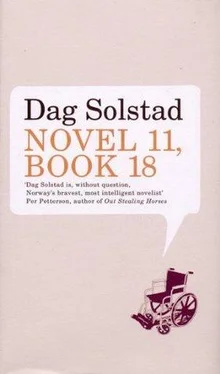Dag Solstad - Novel 11, Book 18
Здесь есть возможность читать онлайн «Dag Solstad - Novel 11, Book 18» весь текст электронной книги совершенно бесплатно (целиком полную версию без сокращений). В некоторых случаях можно слушать аудио, скачать через торрент в формате fb2 и присутствует краткое содержание. Год выпуска: 2011, Издательство: Random House, Жанр: Современная проза, на английском языке. Описание произведения, (предисловие) а так же отзывы посетителей доступны на портале библиотеки ЛибКат.
- Название:Novel 11, Book 18
- Автор:
- Издательство:Random House
- Жанр:
- Год:2011
- ISBN:нет данных
- Рейтинг книги:5 / 5. Голосов: 1
-
Избранное:Добавить в избранное
- Отзывы:
-
Ваша оценка:
- 100
- 1
- 2
- 3
- 4
- 5
Novel 11, Book 18: краткое содержание, описание и аннотация
Предлагаем к чтению аннотацию, описание, краткое содержание или предисловие (зависит от того, что написал сам автор книги «Novel 11, Book 18»). Если вы не нашли необходимую информацию о книге — напишите в комментариях, мы постараемся отыскать её.
He finds a fellow conspirator in Dr Schiøtz, who has a secret of his own and offers to help Bjørn carry his preposterous and dangerous plan through to its logical conclusion. However, the sudden reappearance of his son both fills Bjørn with new hope and complicates matters. The desire to gamble with his comfortable existence proves irresistible, however, taking him to Vilnius in Lithuania, where very soon he cannot tell whether he's tangled up in a game or reality.
Novel 11, Book 18
Novel 11, Book 18 — читать онлайн бесплатно полную книгу (весь текст) целиком
Ниже представлен текст книги, разбитый по страницам. Система сохранения места последней прочитанной страницы, позволяет с удобством читать онлайн бесплатно книгу «Novel 11, Book 18», без необходимости каждый раз заново искать на чём Вы остановились. Поставьте закладку, и сможете в любой момент перейти на страницу, на которой закончили чтение.
Интервал:
Закладка:
From now on Bjørn Hansen began to feel pain whenever his son spoke with enthusiasm about his own times. It hurt to listen to Peter’s explanations of the hectic rhythm of the times, not least the condescending tone in which he addressed Bjørn Hansen, because Bjørn Hansen knew better. But Peter didn’t know that Bjørn Hansen knew, so he continued as before. He spoke with enthusiasm about his own times, out there. About the volume of the electrified howl in the basement room, an almost sacred sound. About the determination of his cohort of students, the new stalwarts of optometry, who refused to let themselves be trampled on, but would turn the practical application of optics into something quite different from what it is today, as little by little they would begin to operate all over Norway, not to mention the rest of the Nordic countries. It pained Bjørn Hansen’s soul to hear Peter discuss his fellow students with great friendliness, indeed, often with admiration. About living here at Kongsberg, under the neon-lit sign of city, a civilisation, highly technological at that, in the middle of the rockpile that is Norway. About the fact that our times are merciless, casting out those who don’t move with them, and rightly so. Here again Peter Korpi Hansen was thinking about young people who had thoughtlessly thrown themselves into yesterday’s fashionable studies and would find the door slammed in their faces when they went to look for a job afterwards. But with an education from the only school in the Northern countries that trained opticians, one was in the front rank. Peter didn’t make a secret of how smart he was, and how this had led him to enrol in the optometry programme at Kongsberg Engineering College, although he admitted that he had been very close to going to Volda, where he would now be studying media. Yes, that’s what could have happened. Chance often prevails. ‘But not all the time,’ he added furiously. ‘Because as soon as I was directed into optics, I said goodbye to any thought of media studies. I had no doubt about what was the right thing,’ he said, and Bjørn Hansen once more had to hear his son’s gloating voice fill the living room of his flat, drowning out the TV, which was also on.
In such instances Bjørn Hansen could not help wondering what would have happened had Peter known that his father knew how things really were with his son. To Bjørn’s surprise it struck him that it would have made no difference. Peter would have said exactly the same thing, in the same tone of voice, still gloating over the same details. This young man, who was superfluous and cast off, was in fact genuinely enthusiastic about precisely his own times and his peers, with whom he cultivated a fellowship, in clothes, music, social tone, and dreams. ‘But you’re so lonely, my son,’ Bjørn Hansen could have said, to which his son would have smiled patronisingly. Lonely. ‘Certainly,’ he would have said. ‘That’s the way of youth. Haven’t you heard our music? The solidarity it creates among us is, after all, based on the fact that it can openly express the damn loneliness which is at the bottom of every modern soul. We can fling it loudly into space, like a resounding howl, and spew it up the wall,’ Bjørn Hansen thought Peter might answer then. ‘In fact, it’s quite natural for a young man to be lonely, Dad,’ he would have added, Bjørn Hansen thought; but he instantly felt a pang, for he had noticed that during the two months his son had lived with him, he had never heard him conclude a sentence addressed to Bjørn Hansen with ‘Dad’.
But then Bjørn Hansen could have confronted him with the fact that the other students refused, after all, to have anything to do with him if they could avoid it. He could have mentioned the episode when Peter had driven a few of them to and from Oslo and how they had ridiculed him for being brazen enough to demand that they should club together on the petrol, as if they were a bunch of friends who had gone to Oslo together. That, too, Peter could have answered: ‘OK, it’s true, that originally they hadn’t meant to take me along. And that they became interested only when I mentioned that I could borrow your car. But so what? It’s often that way in life. You have to use the means at your disposal. I used your car and offered to drive them. Does that mean I’m a “hanger-on”? Maybe, but I felt like being a “hanger-on”. Still, I won’t put up with anything whatsoever just because I have to be a hanger-on and wouldn’t get asked otherwise. One day I will be asked in another way. But while I wait for that, they damn well have to put up with paying for the petrol.’ That is how he imagined Peter might have answered, loudly and preachily. He was enlightening his father about perfectly natural ways of behaving in a given situation, it was as simple as that. Yes, Peter could have explained everything, pointing out that it was an episode experienced in his own times by a young man who, entirely unaffected, shook it off and carried on. The only question that Bjørn Hansen was unable to imagine Peter giving an answer to was 12.35.
In a way it was almost a relief, for the answers he put into Peter’s mouth chimed all too well with the way Peter was, so that his son’s reticence, aloofness and, yes, embarrassment at being confronted every Saturday with having to let himself into the flat and stealing through the living room without waking his father or, if his father awoke all the same, Peter knowing for certain that it was, after all, well past midnight, reconciled Bjørn in some way to his own son. His despair at his son being disliked and rejected by his peers was then countered by Peter’s embarrassment at having been exposed in his freezing loneliness, and this led to a reconciliation with his own son which he otherwise had difficulty achieving — well, even here he achieved it only in his imagination, indeed, at the extreme edge of his imagination.
For he was not certain that he liked his only son, that is, the only thing that would be left after him, in the end. Though he was in despair about Peter’s incurable loneliness, which only expressed itself in his son’s stolen steps across the living-room floor at 12.35 every Saturday night, he understood all too well its cause. He couldn’t endure his son’s preachy and boastful manner. It revolted him, although what Peter expressed in this way was his enthusiasm for his own times, which Bjørn had to allow him, of course, in addition to the fact that it showed his son was prepared to fight hard for the life that was, after all, his own, chillingly his own, Bjørn Hansen might add. It was Peter’s spark of life that manifested itself in this way, what would be left after him, that is, in his own flesh and blood, in the genes, which would blindly push on, in as yet unborn lives. But there was something about this spark of life that frightened him. A sneaky air Peter had. In his relationship with his father. As if he were constantly saying, ‘Don’t even try! You can’t buy me back as your son, in this house I’m a tenant and you’re my landlord.’ There was a distance in everything Peter did which expressed this. Nevertheless, he could not resist the temptation to gain advantage from being Bjørn Hansen’s only son, and in such a way that Bjørn felt certain Peter crowed over it among his fellow students. He was afraid he might offend his son by acting in such a way that Peter was bound to perceive it as an overture to him in his capacity as a father. Make him feel irritated or troubled. There were so many things he would have given him, but held back because he feared Peter would interpret it as pressure to make him come out as a ‘son’. That underhanded air of his every time he accepted something, like his meals, which his father had arranged so that he could eat without having to play the role of ‘son’, suggested a strong, distinctive spark of life in him, which Bjørn nevertheless could never quite resign himself to, because it was without generosity (But how many young men are generous? They can only latch on to their own future!) and without a sense of shame (and he expected to find a sense of shame in a young man), which, he had to admit, also manifested itself in another distinct manner, namely, the pushiness that Peter’s fellow students had experienced and tried to bear with, however grudgingly. Peter was going to be an optician. He spoke about the high level of competency placed at one’s disposal by the Kongsberg Engineering College in this field, as though it were a prize he had pocketed on account of his ability. But the subject itself occupied him very little. He was only mildly interested in optical science, which was, after all, what he was here to learn about. He regarded it as pretty much the price he had to pay to get an education with a future. Bjørn had wondered why Peter, with his good marks, hadn’t looked for another field of study, choosing to become a doctor or an engineer, but that was clearly far from his mind, he showed no ambition at all in that direction. Algot did not explain everything, for if Peter had joined the army with a clear ambition to be a physician, an engineer or a lawyer, even Algot could not have made him choose to be an optician instead. It had been media versus optics, and there Peter had, to his own crowing satisfaction, chosen correctly, namely optics. This decision might seem rather questionable to outsiders, and Peter’s own cocksureness all but incomprehensible. After all, media means power. The new breed of visual and literary scholars, who by virtue of their knowledge can exploit the secret language of the TV screen must, after all, have had a seductive effect on Peter. Nonetheless, he chose to be an optician. To remedy the weaknesses of the eye with the help of optical science. It was unthinkable that he would have made this choice without Algot’s influence, but the strange thing was that he had made this choice at all. Algot’s influence must have been greater than Peter’s dream of belonging to that select group of modern media experts, with their power and adventurous lifestyles, as opposed to the rather sedentary life in the back room of an optician’s shop, albeit dressed in a white smock. But there, in the back room of the optician’s shop, Peter Korpi Hansen was to leave his imprint on existence, as someone who fully understood it. That was his goal. Algot did not come. Optics as a subject was of little interest to Peter. He could have left. The premises for his remaining weren’t there, after all. But he remained. His classmates disliked him, just barely tolerated that he sat down at their table in the canteen. But in the evening he would sit and talk enthusiastically to his father about Kongsberg Engineering College, about its wonderful student life, the pulse of the times, visiting lecturers who came from NIT and were at their beck and call, and about his great fellow students, among whom Åke Svensson from Arvika, in particular, stood high in his favour. For Peter had found his niche. He had found the means by which he would put his own stamp on existence.
Читать дальшеИнтервал:
Закладка:
Похожие книги на «Novel 11, Book 18»
Представляем Вашему вниманию похожие книги на «Novel 11, Book 18» списком для выбора. Мы отобрали схожую по названию и смыслу литературу в надежде предоставить читателям больше вариантов отыскать новые, интересные, ещё непрочитанные произведения.
Обсуждение, отзывы о книге «Novel 11, Book 18» и просто собственные мнения читателей. Оставьте ваши комментарии, напишите, что Вы думаете о произведении, его смысле или главных героях. Укажите что конкретно понравилось, а что нет, и почему Вы так считаете.












